Α)The Christmas Truce of 1914 – When the Impossible Happened
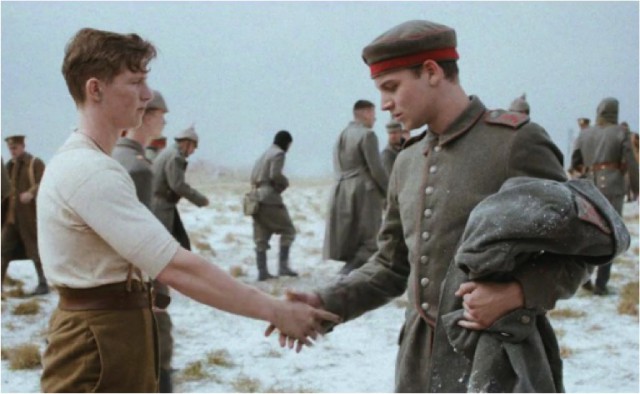
The Allies repelled the German advance at the First Battle of the Marne from September 5 to 12, forcing them to retreat to the Aisne valley where they dug themselves in. The Allies reached them on September 13, and the First Battle of the Aisne began. It ended in a stalemate.
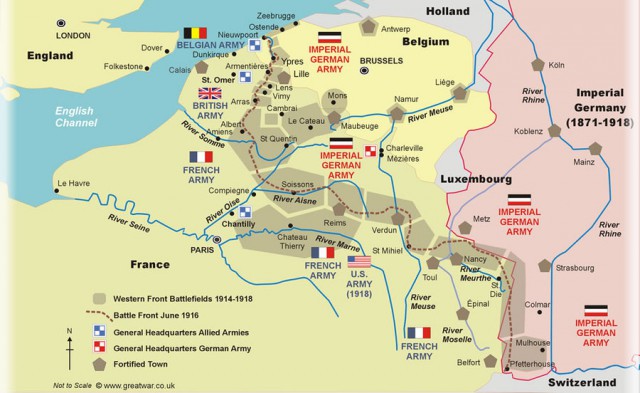
By the start of December, each side had dug over 250 kilometers of trenches and had suffered heavy losses in the first months of the war. Britain lost almost 100,000 men. In August alone, France had lost double that number, roughly the same as Germany.
Not all the deaths were due to combat, however. Disease was rampant in the cold, the cramped and unsanitary conditions, as well as the constant mud and water. There was also trench foot: when feet are constantly soaked. Left untreated, gangrene and death results.
Finally, there was the propaganda. Each portrayed the other as unfeeling brutes because it’s easier to kill a person if you stop seeing them as human. Despite this, there were occasional, hour-long ceasefires so that everyone could dispose of their dead.
On the evening of December 24, however, the Twilight Zone descended. No one is sure where it started exactly, but it’s believed the first incidents began in Flanders before spreading to the rest of the Western Front.
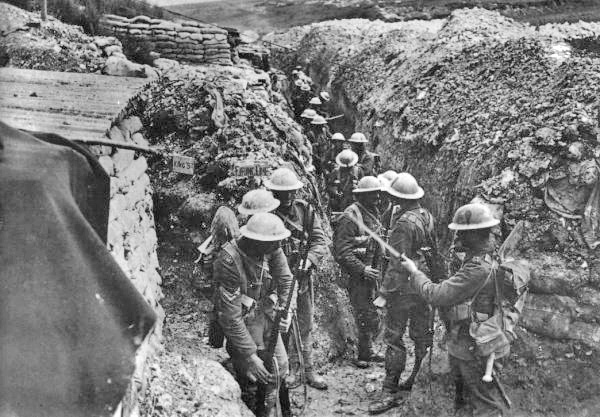
But while most of the Brits understood no German, they recognized the tunes. Some even sang along in English. As they did, more flashlights and lighters were lit among the German line. None of the Brits had the heart to shoot them.
On Christmas morning, Pioneer Sergeant J.J. ‘Nobby’ Hall, stuck a sign on a stick which read “Merry Christmas,” and waved it over the trench. A similar sign was waved over the German line before it popped back under.
Then at noon, a German jumped over his trench as British rifles took aim. The man put his hands up and began walking unarmed across no man’s land. Private Ike Sawyer went out to meet him. In the middle, they shook hands. From the German line, more soldiers stood with their hands up and the Brits met them in the middle.
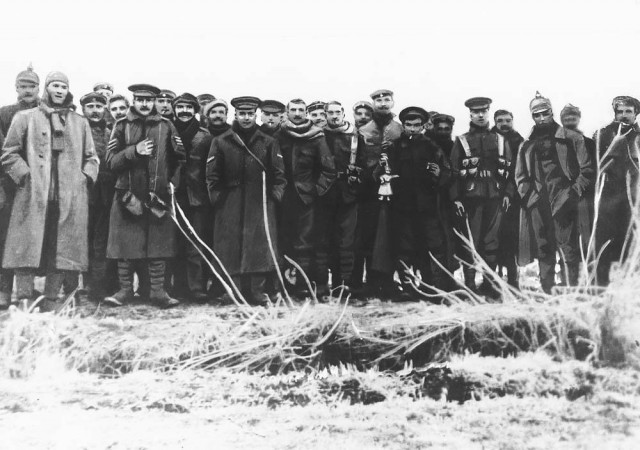
Since many of the Germans worked in Britain before the war, most spoke some English. Some had even met, such as Captain Clifton Stockwell, who found himself shaking hands with a German soldier that had waitered at a restaurant he frequented. Another Brit let his pre-war German barber cut his hair and shave his beard.
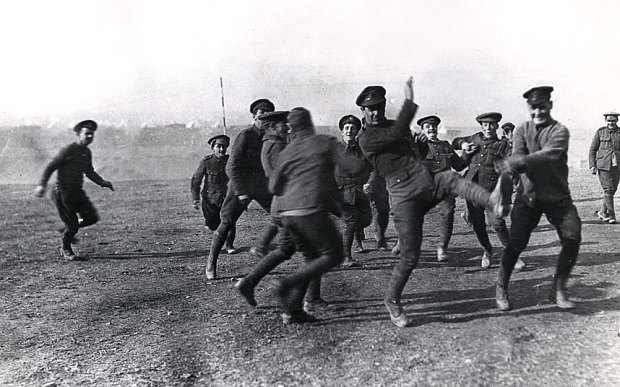
The governments of both sides were mortified. They threatened dire consequences for those who fraternized with the enemy, but it did no good for those who were already on friendly terms. The greatest fear was that the war might end on the Western Front. Worse, with anti-royalist and pro-communist sentiments growing in some countries, what would happen if soldiers dropped their weapons and brokered a permanent peace?

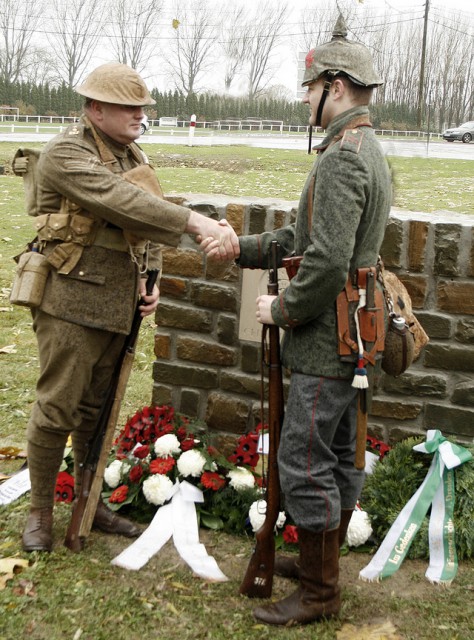
www.warhistoryonline.com
===============================
B)Christmas Truce Story: Ordered to Kill Each Other, British Captain and German Baron Shared Beer Instead
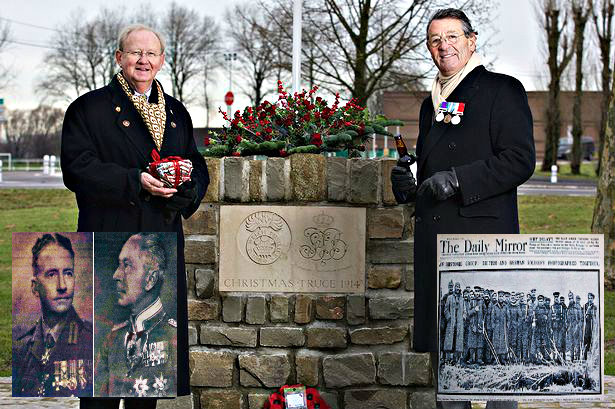
One hundred years ago, instead of killing each other as they were ordered to do, British Captain Clifton Stockwell and German Baron Maximillian von Sinner instead had a toast at the midst of the Great War. A century past, their grand-kids – both involved in military service – met in the same spot to commemorate their grandfathers’ action.
The Orders
On Christmas morning some ten decades ago, two men from the Great War’s warring parties were commanded to kill each other. However, when they met on No Man’s Land, no blood was shed. Instead, they exchanged gifts of plum pudding and shared a beer.The guns fell silent that day as British Captain Clifton Stockwell and German Baron Maximillian von Sinner negotiated a truce lasting for a day all the while toasting each other’s good health.
Soon after, the two parties were engaged in a game of football with the British troops being trashed by the Germans when it came to goals. Meanwhile, the officers smoked cigars and talked to each other showing to each other pictures of their families back home.
The 1914 ceasefire occurred Frelinghien in northeastern France. Starting at exactly eleven in the morning on Christmas day that year, a German soldier started it by walking towards the trench of the Royal Welsh Fusiliers with his hands up in the air. A British soldier climbed out of the trenches to meet that German soldier despite his officers’ attempts to stop him. When they did meet, the German serviceman presented the latter with a box of cigars.
Witnessing the scene unfold, the rest of the Fusiliers, with eagerness, wanted to come up as well. So, Captain Stockwell took upon himself the task of making contact with the officers of the other side. He called out to them to meet him.
It was Baron von Sinner who answered his call. Upon meeting on No Man’s Land, the two agreed to a truce that would last until midnight. With this agreement, the German soldiers belonging to the 134th Saxon Infantry rolled out three barrels of beer – taken from a nearby French brewery – and shared them with the British troops.
Both sides went on to make large banners wishing each other to have a merry season that they, then, put up just above their trenches.
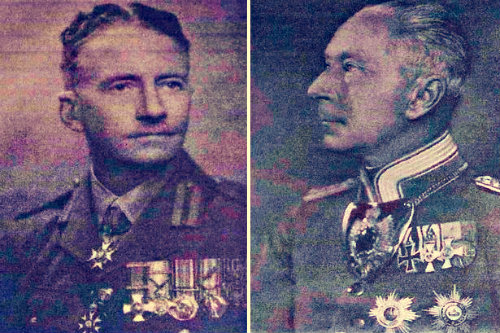
- Clifton and Maximillian, the two officers of the warring sides, who decided on a truce, shared plum pudding and a beer toast during the Great War.
Aside from his account about the truce in his journal, it is also believed that Stockwell wrote this poem alluding to that one-day truce on Christmas day of 1914.
Entitled Christmas 1914, it goes as follows:
Twas a frosty Xmas morning
In our trenches on the Lys
And a fog was hanging thick along the fields
You could hear the Bosches singing
But no Xmas bells were ringing
’Cept the tinkle of the bullets on shields.
When the fog at last had lifted
And the Bosches glances shifted
On our parapet in front of them they saw;
On a notice board in writing
From the men that they were fighting
“Merry Xmas” and Kaisers heads galore.
Then the Bosches started shouting
“Will you come and take an outing?”
And a row of heads along our line appear
For two Saxons greatly daring
To our trenches were boldly faring
With a barrel of the most indifferent beer.
Thus when after-dinner came
Both sides did more of the same
And their trenches boldly left and came abrad
And with barrels full of beer
And something of good cheer
Made an effort to arrive at an accord.
Then the officers conferred
While our rations were transferred:
To a truce between the two they did agree,
That till dawn the following day
None should shoot or forward stray
Whilst our notice board the enemy could see.
The Comeback
A century after that Christmas truce, the grandsons of the two officers returned to the same spot where they stood, they talked and toasted beer bearing the same items their grandfathers brought that day — beer and plum pudding.
In 2014, 71-year-old retired British Major Miles Stockwell and 63-year-old retired German Colonel Joachim Freiherr von Sinner visited the same location where their grandpas met. Both men had followed in their ancestors’ footsteps and had served in the respective military organizations of their countries.
According to Miles, who also served in the Royal Welsh, the story between their grandfathers is amazing. They had been ordered never to fraternize with the enemy that was why there were never pictures taken of that day and the two of them together.
He went on to say that deciding to ignore the orders of the ones above them had been risky but still they pushed forward to meet on the muddy No Man’s Land while their men cheered in the background. Miles added that his grandfather didn’t have anything to give as a peace offering that day, only a plum pudding he had been set, so he fetched that and handed it to the German baron.
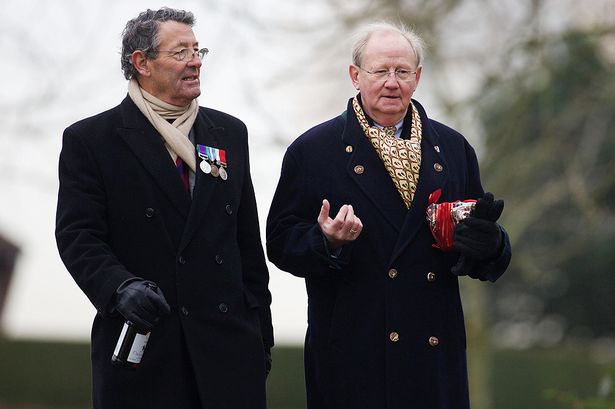
- Miles and Joachim honored their grandfathers in 2014 by bringing and exchanging plum pudding and beer on the exact spot where their ancestors stood a century ago.
Miles, then, pointed out that this story just goes on to show what possible things happen when people just stop fighting and start talking.
www.warhistoryonline.com
========================================
Γ)Watch: Christmas In The Trenches (1914-1918)
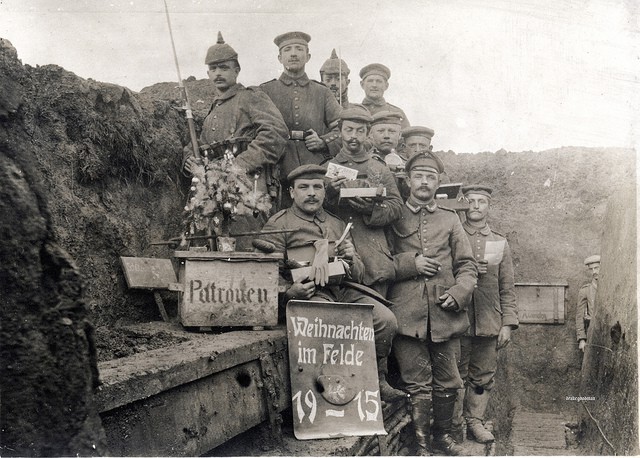
The Christmas truce in 1914 was a series of widespread but unofficial ceasefires along the Western Front around Christmas 1914. In the week leading up to the holiday, German and British soldiers crossed trenches to exchange seasonal greetings and talk.
In December 1915, there were explicit orders by the Allied commanders to forestall any repeat of the previous Christmas truce. Individual units were encouraged to mount raids and harass the enemy line, while communicating with the enemy was discouraged by artillery barrages along the front line throughout the day. The prohibition was not completely effective, however, and a small number of brief truces occurred.
It came to nothing, as the brigade commander threatened repercussions for the lack of discipline, and insisted on a resumption of firing in the afternoon. Another member of Griffith’s battalion, Bertie Felstead, later recalled that one man had produced a football, resulting in “a free-for-all; there could have been 50 on each side” before they were ordered back.
In the Decembers of 1916 and 1917, German overtures to the British for truces were recorded without any success. In some French sectors, singing and an exchange of thrown gifts was occasionally recorded though these may simply have reflected a seasonal extension of the live-and-let-live approach common in the trenches.
British soldiers stand in a trench around a bucket sitting on a grill over a small fire; someone off-camera hands a tin can to one of the men. He puts the can inside the bucket (a primitive double-boiler is the invention here), later a soldier removes a can from the bucket.
Shot of the enterprising cook dishing up tastes of the pudding to other soldiers; who stand in line in the trench. Shot of group of soldiers facing camera and eating; with big smiles.
The soldier in the front has a large moustache and is enjoying his Christmas pudding!
www.warhistoryonline.com
[embed]https://youtu.be/1emCCXegsKk[/embed]

Δεν υπάρχουν σχόλια:
Δημοσίευση σχολίου